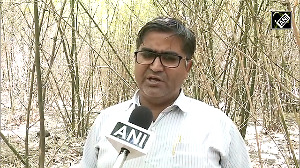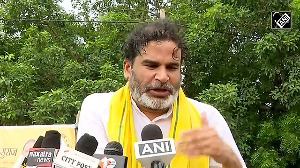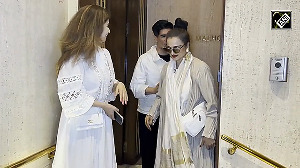An Indian astronaut will embark on a mission to space in a Russian spacecraft within the next five years, nearly three decades after Rakesh Sharma undertook the historic flight.
This mission, tentatively scheduled for 2013, will be the precursor to Indian Space Research Organisation's maiden human spaceflight planned to be launched in 2015.
India and Russia signed a Memorandum of Understanding on Joint Activities in the Field of Human Spaceflight Programme during the recent visit of Russian President Dmitry Medvedev.
"As per the agreement, an Indian astronaut will first go on a space mission on a Russian spacecraft. This will be followed by an Indian manned mission to space in 2015," ISRO Chairman G Madhavan Nair said in New Delhi.
Under the MoU signed by Nair and his Russian counterpart Anatoly Perminov, ISRO and Russian space agency Roskosmos will jointly build the spacecraft for the Indian manned mission.
"We will be redesigning the Soyuz space capsule of the Russian agency for our mission," Nair said.
The government has already sanctioned Rs 95 crore to study all aspects of the manned space mission under which ISRO plans to send a two-member crew on a week-long sojourn in space.
The spacecraft, to be placed in a low earth orbit, will splash in the Indian Ocean after completion of the mission.
ISRO is setting up an astronaut training centre in Bangalore. For the two-member mission, a batch of 200 would be initially selected and trained before opting for four persons out of which two would go on the mission.
India is also looking at having manned lunar mission by 2020 and a mission to Mars by 2030.
Upbeat over the success of Chandrayaan-I, the country's maiden mission to moon, India and Russia are already working on a sequel which entails landing a rover on moon.
The two countries have already launched technical discussions for the Chandrayaan-II project, which was signed during Prime Minister's visit to Moscow last year.
Last year, ISRO had sent to space a capsule, which was recovered after keeping in orbit for 22 days. The Space Recovery Experiment was seen as a technology demonstrator for future manned missions.
Russia and India are also expected to collaborate on launch vehicles for future space missions. The two sides will also set up the India-Russia Centre for Technology Transfer.
India launched its first satellite Aryabhatta in 1975, which was followed by another successful launch in 1980. Rakesh Sharma, an Indian Air Force pilot, became the first Indian astronaut when he travelled to outer space on an Indo-Soviet mission onboard Salyut-7 on April two 1984.
The human space flight mission holds immense potential in terms of telemedicine, material science and would involve various work packages before it is launched.
It includes development of human-rated GSLV, an escape system, an environmental life support system, thermal protection system for re-entry into the earth's atmosphere, facilities for training astronauts and crew and with mission management system in place with man being in the loop.






